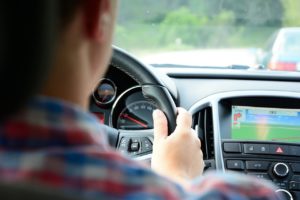
In-car technology has developed significantly over the past few decades. Whereas drivers and passengers were once dependent upon analog radios for entertainment and maps for navigation, modern motorists have a host of tools at their disposal to provide for a more enhanced driving experience. Now, drivers can use built-in GPS systems to maneuver around town, and can watch their movements in a camera to avoid a rear-end collision when backing out of a parking spot.
These instruments were developed to make traveling safer and more efficient; but they can all, however, pose a serious distraction to drivers. Visual maps and touchscreen-operated tools may, in fact, take a driver’s attention away for enough time to lead to a catastrophic accident. In the event of such an accident, should the driver be the sole responsible party for his or her injuries? Or should he or she be able to hold responsible the device manufacturer who created the distraction in the first place?
Do In-Car Electronics Cause More Distractions While Driving?
Distracted driving is widely regarded as one of the most dangerous hazards on the roads. Distractions such as eating, grooming, talking, or using various devices of technology can cause drivers to take their attention away from the road, thus contributing to the possibility of a crash. Statistics further highlight this danger; the National Highway Traffic Safety Administration (NHTSA) reports that in 2012, approximately 421,000 people were injured in car crashes involving a distracted driver.
In order to decrease this number, states across the nation have enacted bans on texting while driving. Texting while driving is considered one of the most dangerous distractions for drivers. Although there is no statewide ban on cell phone use in Texas, many local jurisdictions prohibit or limit the practice.
But what about distractions presented by in-car infotainment and navigation systems? Although the use of these systems is not banned while driving, the NHTSA has taken them into consideration; in 2012, the organization offered a set of guidelines that automakers should examine when creating in-car systems. Specifically, the NHTSA suggested that these systems should not exceed a reasonable level of complexity or contain unnecessary information in the driver’s view, should limit the amount of time a driver is required to use the system to two seconds, and should only require the driver to use one hand for operation. So far, this is only a proposal for change, which means that automakers are not bound under these regulations.
Can Automakers Be Held Liable for In-Car Distractions?
Because there is no law governing the content and use of in-car instruments, are automakers shielded from liability if their tools ultimately contribute to a crash? While there are many conditions affecting results, the short answer is, not necessarily. Court results involving in-car distractions are constantly developing and these precedents will affect all future litigation. As lawsuits continue to emerge the precedent pool will grow and outcomes can be better anticipated. You can improve the probability of a successful case with the help of an experienced Texas attorney to help you recover compensation for damages.
Dallas Distracted Driving Lawyer
If your distraction due to an in-car entertainment or navigation device has led to a crash resulting in injury, don’t assume that liability is yours alone. Instead, call Tate Law Offices, P.C., at 888-565-7068 for a free case review.
Not Ready to Chat? Use these Resources:
- Car Accident Lawyer in Dallas, Houston, and Ft. Worth
- What To Do After A Car Accident in Texas
- Maximize Your Case Value In Your Texas Injury Claim
- How to Deal with Insurance Companies After a Ft. Worth Car Accident
- Should You See a Doctor After A Texas Car Accident?
- How Do You Get a Rental Car After a Car Accident?
- What are Common Car Accident Injuries?
- Get a Free Case Review in Dallas, Houston, or Ft. Worth
- Insights to Understanding Car Insurance in Texas
- Picking the Right Texas Car Accident Attorney
- Texas Car Accident FAQs
- Texas Car Accident Legal Resources

Tim received a business degree in finance from Southern Methodist University and a Juris Doctor (law degree) from South Texas College of Law. Over the last two decades Tim has represented victims of injuries day-in and day-out throughout the state of Texas as well as in numerous other states throughout America. Tim’s mission on every case is always to get the insurance company of the defendant to pay top dollar for his client’s case, which allows his clients to put the maximum amount of money into their pocket.



